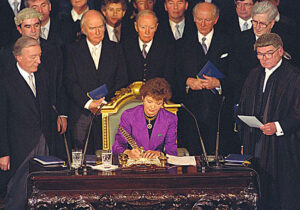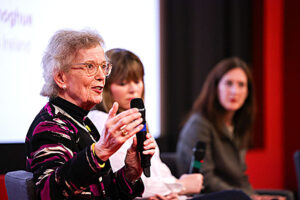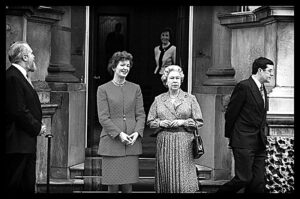
Aoife Kelleher told David Hennessy about her documentary about Ireland’s first female President which opened the Irish Film Festival London.
The documentary Mrs Robinson opened last year’s Irish Film Festival London.
Aoife Kelleher’s documentary tells the story of Mary Robinson, Ireland’s first female President.
Having served as Senator, Mary Robinson became the first woman to take office in Áras an Uachtaráin in 1990.
She would then go on to become UN High Commissioner for Human Rights.
Since leaving that post, she has worked extensively in human rights and climate justice.
Aoife spoke to us ahead of the festival.
Aoife Kelleher told The Irish World: “It’s a huge honour.
“We’re really excited about it.
“I love London and love the festival, so it really is an honour.”
How did the film come about?
“Cormac Hargaden, the producer, approached me in 2019 and said that he wanted to pitch to Mary Robinson and he was hoping that I’d come on board and that we would do up a pitch together.
“So in 2019 he and I put together a pitch for a concept for a documentary. We were pitching against two other companies as it turned out.
“I think Mary liked our pitch which was a warts and all look at her career to date, kind of giving her the chance to reflect on her life from the beginning and consider some of the key challenges that she’s faced and the battles that she’s fought, whether it was as a human rights lawyer in Ireland, the really tough and gruelling Presidential campaign that ended up being quite personal. I think the cut and thrust of that campaign was very, very challenging for her. I think she might have been questioned in ways that she wasn’t expecting, her family life being brought into the public arena and all of that.
“And then on to the UN. When the war on terror broke out, when she ended up having to really be quite negative for the first time in her career about the United States and this kind of notion of ‘truth to power’ really coming to the fore.
“And now climate justice being her main focus.
“I think giving her the chance to look through all of that was very appealing to her as well as some of the more controversial elements in her career and how really affronted and hurt the Irish public were when she didn’t complete the term of her presidency.
“Some people might feel that that ending a presidential term a few months early might be a storm in a teacup but actually, I think there was a huge sense of affront on the part of the Irish people when she left,
“It’s something that she really acknowledges as a mistake.
“Then, more recently, she got embroiled in the case of Dubai’s missing princesses and the saga of Princess Latifa al Maktoum.
“It’s a lot to get into a documentary but I think the chance to reflect on her life and talk about some of the challenges and some of the controversies really appealed to her.”
That was key, wasn’t it? It struck me watching it that she didn’t just talk about the comfortable aspects but, as you mention there, controversial elements..
“There were points in the presidency where she went out on a limb a bit whether it was shaking Gerry Adams’ hand and meeting the nationalist community in Belfast. And that ended up playing out really well for her and were very popular at home.
“But I think she’s the first to say that she didn’t get it right all the time and most notably in the presidency at the end and leaving to become the UN High Commissioner, that really caused a lot of upset.”
She is also shown getting emotional which is refreshing for to see a leader like that. Seeing her get choked up at the horror she witnessed on a trip to conflicted Somalia shows she is human..
“She talks a lot about Somalia and I think it was a real turning point not only in her presidency but in the whole of her career.
“I think as she became emotional when she was giving that press conference, she really felt she was letting herself down.
“And I think she was surprised at the fact that it had such an impact but it stands to reason.
“I think we’re watching world leaders now make decisions that have really extraordinary repercussions on countries and on communities and on individual lives.
“I don’t know that I necessarily want leaders to be cool and calculated and totally detached.

“I think that when leaders emotionally connect with the decisions that they’re making, that feels right to me, that feels appropriate”
Were there surprises for you along the way of making the film?
“Yeah, absolutely.
“It was wonderful to meet Nick (husband) because I think that they had a really significant and important kind of love story
“He has been such an extraordinary support to her and he’s really been willing to allow her to be in the limelight.
“It was a very unusual relationship.
“It was actually the target of a lot of comedy in Ireland.
“The depiction of Nick was often far from flattering.
“I think that there’s an element of misogyny to that: This idea that men are supposed to be alphas and really should be taking the lead all the time.
“And he was very upfront that it was an honour to support her and be present throughout her career.
“That was really interesting.

“And then what I found really appealing was digging into the early years of her career and her work with the Irish Women’s Liberation Movement and meeting some of the women who were involved in that.
“The years that that she worked as a really pioneering human rights lawyer in Ireland, there was really extraordinary archive material from that era and battles that I wouldn’t necessarily have been aware of like for the right for women to sit on juries.
“I hadn’t realised that that was remotely contentious in the 1970s, it’s pretty astounding.”
The film makes use of video footage of Mary’s upbringing and home life to show a different side of her.
“You also get to see heras a daughter, but also as a wife and a mother.
“And you can see her quirky approach to parenting, watching her run along the beach with Nick and the kids.
“They’re all very relaxed and informal, and Mary’s kind of shuffling along in her suit with her briefcase.
“You get to see the reality of their lives together.
“I think here’s always something extraordinary about looking behind the scenes of a very public life and to get a sense of what really matters to her and it’s wonderful to have it.
“It’s beautiful footage.
“It’s very unusual that a family would have that kind of home movie footage from that period so it’s historically significant as well as personally significant.
“It was extraordinary to have.”

Her time in America at Harvard really had a profound impact on her, didn’t it? Seeing people protesting and fighting for their rights, whether it was in opposition to the Vietnam War or other things, she felt we needed more of that fight in Ireland..
“Yeah, I think that America was really important because young people in Harvard were taking on issues and really kind of coming to the fore in relation to whether it was the civil rights movement, feminist issues and so on.
“I think that Mary had felt that there was perception in Ireland that you had to ‘wait your turn’ and that young people had to kind of sit it out and respect their elders and not try to push forward.
“But seeing the students in Harvard take on issues like the draft, like civil rights and so on, I think that was really inspiring for her.
“She came home with this sense that she had every right to put herself forward.
“I think that was pretty astounding in a country where there were so few women in public life and so few young people in public life.”

Mary Robinson became Ireland’s first female President in 1990. It is easy to forget what a different country Ireland was in 1990 and a colder one in its acceptance of different groups..
“It was (a colder place). It’s interesting to see how many of those key issues that that she was involved in.
“She had opposed the Eighth Amendment to the Constitution.
“She had fought for women to have the right to divorce.
“She had been, in particular throughout the 80s, the losing side of many of these clashes between liberal and conservative Ireland.
“Then when she won the presidency and was established in Áras an Uachtaráin, she made a real effort to open the Áras to minorities who were hugely overlooked in Irish society.
“She invited representatives of the traveller community, representatives of the gay and lesbian equality network.
“She describes the day when the gay and lesbian community came to Áras an Uachtaráin, and when they were asked to pose for a photo, as was the norm when groups came to visit the Áras, and how many of them didn’t want to be in the photo or were in the background because they didn’t want to come out, they didn’t want to reveal their sexuality in public.
“It’s extraordinary remembering that homosexuality wasn’t even legal in Ireland at the time.
“I think one of the key purposes of the film was to encourage us all to reflect on how far Ireland has come and know how precious this progress is and you can’t take it for granted.
“You have to really work to maintain the rights that have been won over the last few decades.”

Was it great responsibility telling such a huge story that is central to Ireland’s history?
“Absolutely.
“We had so much material.
“And when you’re working with a career with so many acts, when you’re looking at a life that was as big as it was, there’s a lot for you to kind of factor in.
“It’s a challenging edit and you just hope you’ve been able to do it justice.
“There were a lot of moments in the edit where we had to stop it from becoming a big, sprawling film.
“There were aspects of her life and her work that we had to leave out.
“I would have liked to have spent more time on reproductive rights, for example.
“She was involved in the campaign for free legal aid which was really critical, particularly in relation to women who were trying to get separations.
“You could have spent so much more time on the women’s movement, on divorce, on contraception.
“There’s an extraordinary debate on questions and answers actually following the insertion of the Eighth Amendment into the Constitution where Mary Robinson basically predicted the X case a decade in advance.
“She said that this would happen, this would be a direct result of the Eighth Amendment.
“We had that in the cut for so long and it was really tough to have to leave it out.”

In the film Richard Branson tells of Nelson Mandela asking for Mary when putting together a panel of leaders. It really shows the regard she is held in, doen’t it?
“Yeah, it’s interesting.
“Obviously she’s been significant in Irish life, particularly as the first woman president.
“But it’s interesting to see how highly she was rated by people like Nelson Mandela and later by Archbishop Tutu and how highly they regarded her and her input and her impact in the area of human rights.”
You grew up in Mary’s presidency, what does she mean to you?
“I think that was actually what really appealed to me when Cormac kind of came and suggested making a documentary about her.
“I remember I was eight years old when she won that campaign and became the first woman president.
“It really was a moment where things that had not seemed possible before for young women and other minority communities in Ireland and a lot that had been off the table suddenly became a realistic possibility.
“It was a game changer in Irish life and in Irish culture and in Irish society.
“I remember other girls in my class suddenly talking about being lawyers or becoming the president.
“I do think that it was a really pivotal moment.
“I think those kinds of things percolate down.
“I think it is that old saying that you can’t be what you can’t see.
“If women are out there on the public stage, that is inspiring for young girls.”

What was Mary’s own reaction to the film?
“She is very vocal and upfront about the fact that she didn’t necessarily want to make a documentary.
“Her advisor Bride Rosney really did a lot of work to persuade her.
“Bride’s view that it’s really important to tell stories, particularly stories of women leaders, to try and inspire the next generation particularly at a time when social media, for example, is making it very hard for women in politics and in public life generally because there’s so much vitriol in the public sphere and people can really be exposed to a lot of insults and derogatory language and death threats even, and the rest of it.
“I think that was really what saw her through because she’s a private woman, she’s quite shy.
“It was this desire, I think, to pay it forward and to encourage the next generation that kept her bought into the process and that made viewing the documentary itself bearable for her, but I think she’s happy with it now.”
Mrs Robinson screens at Glasgow Film Theatre on 28 January, The Kiln Theatre in London on 29 January and MAC Birmingham on 1 February.
For more information and to book, click here.



